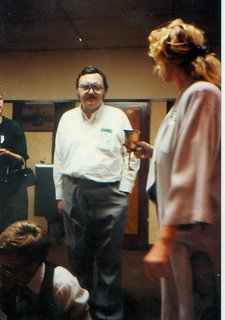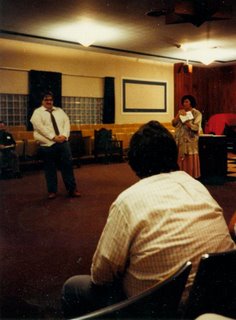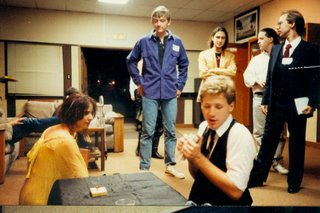
Chuck Hammill converses with Eris, the Greek goddess of discord and chaos. During the interrogation, Chuck discovers that epiphanies flow in two directions simultaneously. Note the metaphysical concern on his face. I think she knows how to use that scepter in her left hand.

Are we all role playing in our efforts to advance our intentions? Chuck Hammill applied the descriptive and predictive power of "chaos theory" (with its limits of strange attractors and initial conditions) to human social interactions. Thus, the science of Theo-Crypto-Ecology is born, adhering to Adam Smith's Free-Market Economics, a dynamic system of human expression as applied to the need for religious ecstasy. Revelation can be predicted, nirvana forecast, satori scheduled. Yet, humans are free to act, distinct from and above the beasts, and far above empty-skulled robots.

Robert Anton Wilson (white coat) oversees the encounters of the "role players" as they follow their prescribed destinies. Each player's "journey" can be graphed as if it were a quadratic equation. The one goal is self revelation; a quality that cannot be externally induced...but it can be accelerated. Yet, human freedom is constantly maintained, and at no time does determinism squelch the immortal flame of individuality. Where the graphs' intersect indicates a "revelation point" between (or among) the people involved.

An encounter with a law-giver creates an authoriarian anxiety that some people accept or reject with enthusiasm, and facilitating a depth of meaning necessary for the enjoyment of life.

To make sense of the ambiguous events foisted upon us by what appears to be an uncaring universe, Humanity often appeals to the slowly-turning wheels of justice (cosmic or corporate). This gambit can provide profound meaning or deep frustration, depending on a person's (or society) ability (or willingness) to interpret the omens. The ancient Greeks proposed that merciful Zeus could deliver 'nepenthe' to us, an elixir that allows us to temporarily forget our pain and anxiety, so we may have a dreamless sleep.

Are humans addicted to religion? These two seem to know the answer.

Which holds more influence? Epistemology (knowing) or ontology (being)? Can the two human experiences be separated? What system of experience is better describale by linguistics, emic or etic? Do we all seem to be verbs? Do we conclude, as Buckminster Fuller conjectured, that 'God is an Equation', a linguistic (or mathematical) construct, yielding shifting answers, depending upon the variables? Is Noam Chomsky correct, that a "Linguistic Acquisition Device" (LAD) is hardwired into each of our human brains, subjecting us to verbal delusions and phantoms whereby words seem to have an (illusory) objective "exisitence" beyond our philological, lexical, definitions? What are the starnge attractors that define our limits?

Humans seem to be self-programming bio-appliances, who crave theological explanations and experiences. This vest-wearing young man (holding the tarot cards) is about to ask us if god resides inside or outside of us... a simple question which produces astonishing (possibly terrifying) implications no matter how we may answer. Is god within us? Then we become responsible, with awesome consequences, for 'His' divine expression! Outside of us, does god reside? Then, we risk eternal alienation if we translate His expression incorrectly, and must choose either gnostic privation (fasting, vows of silence, self-mortification) for a correct revelation, or gnostic hedonism to re-align the plow to the yak.
 Chuck Hammill converses with Eris, the Greek goddess of discord and chaos. During the interrogation, Chuck discovers that epiphanies flow in two directions simultaneously. Note the metaphysical concern on his face. I think she knows how to use that scepter in her left hand.
Chuck Hammill converses with Eris, the Greek goddess of discord and chaos. During the interrogation, Chuck discovers that epiphanies flow in two directions simultaneously. Note the metaphysical concern on his face. I think she knows how to use that scepter in her left hand. Are we all role playing in our efforts to advance our intentions? Chuck Hammill applied the descriptive and predictive power of "chaos theory" (with its limits of strange attractors and initial conditions) to human social interactions. Thus, the science of Theo-Crypto-Ecology is born, adhering to Adam Smith's Free-Market Economics, a dynamic system of human expression as applied to the need for religious ecstasy. Revelation can be predicted, nirvana forecast, satori scheduled. Yet, humans are free to act, distinct from and above the beasts, and far above empty-skulled robots.
Are we all role playing in our efforts to advance our intentions? Chuck Hammill applied the descriptive and predictive power of "chaos theory" (with its limits of strange attractors and initial conditions) to human social interactions. Thus, the science of Theo-Crypto-Ecology is born, adhering to Adam Smith's Free-Market Economics, a dynamic system of human expression as applied to the need for religious ecstasy. Revelation can be predicted, nirvana forecast, satori scheduled. Yet, humans are free to act, distinct from and above the beasts, and far above empty-skulled robots.  Robert Anton Wilson (white coat) oversees the encounters of the "role players" as they follow their prescribed destinies. Each player's "journey" can be graphed as if it were a quadratic equation. The one goal is self revelation; a quality that cannot be externally induced...but it can be accelerated. Yet, human freedom is constantly maintained, and at no time does determinism squelch the immortal flame of individuality. Where the graphs' intersect indicates a "revelation point" between (or among) the people involved.
Robert Anton Wilson (white coat) oversees the encounters of the "role players" as they follow their prescribed destinies. Each player's "journey" can be graphed as if it were a quadratic equation. The one goal is self revelation; a quality that cannot be externally induced...but it can be accelerated. Yet, human freedom is constantly maintained, and at no time does determinism squelch the immortal flame of individuality. Where the graphs' intersect indicates a "revelation point" between (or among) the people involved. An encounter with a law-giver creates an authoriarian anxiety that some people accept or reject with enthusiasm, and facilitating a depth of meaning necessary for the enjoyment of life.
An encounter with a law-giver creates an authoriarian anxiety that some people accept or reject with enthusiasm, and facilitating a depth of meaning necessary for the enjoyment of life. To make sense of the ambiguous events foisted upon us by what appears to be an uncaring universe, Humanity often appeals to the slowly-turning wheels of justice (cosmic or corporate). This gambit can provide profound meaning or deep frustration, depending on a person's (or society) ability (or willingness) to interpret the omens. The ancient Greeks proposed that merciful Zeus could deliver 'nepenthe' to us, an elixir that allows us to temporarily forget our pain and anxiety, so we may have a dreamless sleep.
To make sense of the ambiguous events foisted upon us by what appears to be an uncaring universe, Humanity often appeals to the slowly-turning wheels of justice (cosmic or corporate). This gambit can provide profound meaning or deep frustration, depending on a person's (or society) ability (or willingness) to interpret the omens. The ancient Greeks proposed that merciful Zeus could deliver 'nepenthe' to us, an elixir that allows us to temporarily forget our pain and anxiety, so we may have a dreamless sleep. Are humans addicted to religion? These two seem to know the answer.
Are humans addicted to religion? These two seem to know the answer. Which holds more influence? Epistemology (knowing) or ontology (being)? Can the two human experiences be separated? What system of experience is better describale by linguistics, emic or etic? Do we all seem to be verbs? Do we conclude, as Buckminster Fuller conjectured, that 'God is an Equation', a linguistic (or mathematical) construct, yielding shifting answers, depending upon the variables? Is Noam Chomsky correct, that a "Linguistic Acquisition Device" (LAD) is hardwired into each of our human brains, subjecting us to verbal delusions and phantoms whereby words seem to have an (illusory) objective "exisitence" beyond our philological, lexical, definitions? What are the starnge attractors that define our limits?
Which holds more influence? Epistemology (knowing) or ontology (being)? Can the two human experiences be separated? What system of experience is better describale by linguistics, emic or etic? Do we all seem to be verbs? Do we conclude, as Buckminster Fuller conjectured, that 'God is an Equation', a linguistic (or mathematical) construct, yielding shifting answers, depending upon the variables? Is Noam Chomsky correct, that a "Linguistic Acquisition Device" (LAD) is hardwired into each of our human brains, subjecting us to verbal delusions and phantoms whereby words seem to have an (illusory) objective "exisitence" beyond our philological, lexical, definitions? What are the starnge attractors that define our limits? Humans seem to be self-programming bio-appliances, who crave theological explanations and experiences. This vest-wearing young man (holding the tarot cards) is about to ask us if god resides inside or outside of us... a simple question which produces astonishing (possibly terrifying) implications no matter how we may answer. Is god within us? Then we become responsible, with awesome consequences, for 'His' divine expression! Outside of us, does god reside? Then, we risk eternal alienation if we translate His expression incorrectly, and must choose either gnostic privation (fasting, vows of silence, self-mortification) for a correct revelation, or gnostic hedonism to re-align the plow to the yak.
Humans seem to be self-programming bio-appliances, who crave theological explanations and experiences. This vest-wearing young man (holding the tarot cards) is about to ask us if god resides inside or outside of us... a simple question which produces astonishing (possibly terrifying) implications no matter how we may answer. Is god within us? Then we become responsible, with awesome consequences, for 'His' divine expression! Outside of us, does god reside? Then, we risk eternal alienation if we translate His expression incorrectly, and must choose either gnostic privation (fasting, vows of silence, self-mortification) for a correct revelation, or gnostic hedonism to re-align the plow to the yak.